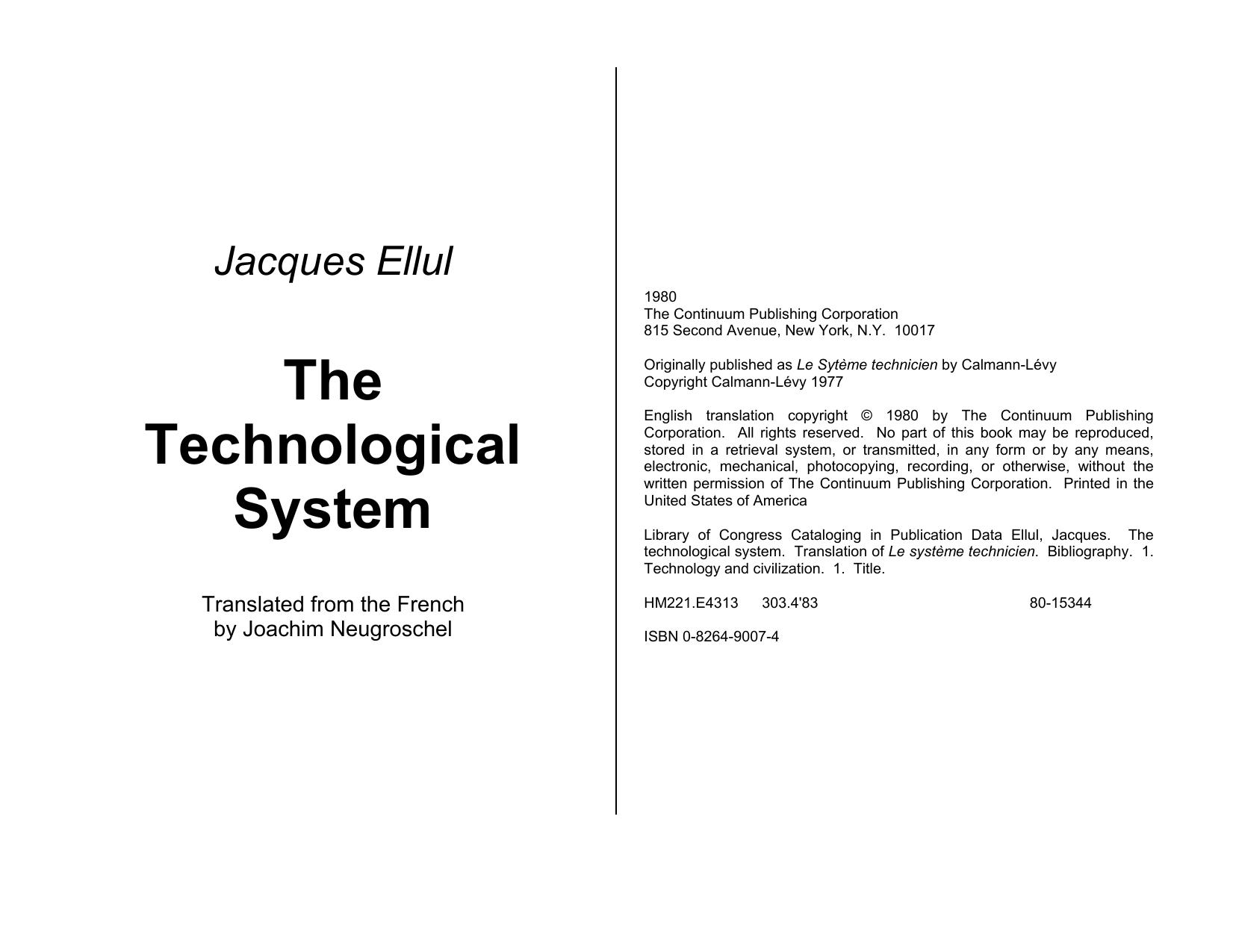The Technological System by Jacques Ellul

Author:Jacques Ellul [Ellul, Jacques]
Language: eng
Format: epub, pdf
Publisher: The Continuum Publishing Corporation
Published: 1980-01-01T00:00:00+00:00
And likewise, I believe that A. Touraine is perfectly right when he shows that social class is no longer the explicative factor of cultural behavior. "The movie-goer or car-owner is no longer part of any social group, and he suffers from the incessant transitions he has to make from the mass working world to undifferentiated clothing, spectacles, and sports.â Technologies do not fit into any one class; they decisively modify social behaviors and tend to bring about their identification, under the mask of divergent ideologies. Aside from such remarks, we must bear in mind that the technological phenomenon shapes the total way of life. It is a platitude to say so. But this entails the universalism of technology. Let me just mention domestic equipment. It is certainly a positive thing, but we also know that it brings a certain type of existence, which has been called one of "accumulation and solitude."3 The housewife bends under the weight of objects, whether they are the ones she buys or the more tyrannical ones that she cannot afford to buy. Moreover, the housewife does all the old housework in solitude, whereas this same housework formerly involved a relation, a collective labor. We are dealing with an upheaval that is described as the liberation from household drudgery (indeed it is), but that also brings burdens and a new conception of life.
Jorge d'Oliveira E Sousa has written a fundamental article entitled "Les Métamorphoses de la guerre" (Science et Paix, 1973). Here, he admirably shows that every technological innovation acts both on the system of standards (removing prohibitions, burning ethical codes that are now antiquated, splitting positive standards) and on the (international) political system. But, in their turn, standards and systems appropriate technological innovations and regulate their use, assigning limits, and imposing modalities of existence upon them. We are dealing with three variables that react to one another. Technological progress has given preponderance to the technological variable, and the technological discourse contradicts the ethical and legal discourse. Technological military power, as the author does a fine job of pointing out, induces the creation of a sort of worldwide feudalism. But it is not atomic power that creates the absolute distance between the "big" and the "little" nations; it is the technological refinement (technology's trend toward miniaturization). For atomic weapons will never be used in local conflicts; whereas, in contrast, electronic armaments "push the asymmetry between the combatants and their means to the extreme.â "Electronic warfare" explodes the ethical discourse on war (the promised outlook is no longer death, but suffering). New weapons are replacing the natural environment (destroyed by defoliants) with an electronic "natural" environment. "The traditional legal and moral conventions belong to a world of the past, the world of conventional warfare. The new forms of violence-technological-have not yet found an [adequate] discourse for their own law and their own morality.â Altogether, this article reveals the extent to which technology has become autonomous and determinative.
We have to add the use of chemical factors, which modify, notably, activities or behaviors whenever we like.
Download
This site does not store any files on its server. We only index and link to content provided by other sites. Please contact the content providers to delete copyright contents if any and email us, we'll remove relevant links or contents immediately.
| Automotive | Engineering |
| Transportation |
Whiskies Galore by Ian Buxton(40341)
Introduction to Aircraft Design (Cambridge Aerospace Series) by John P. Fielding(32339)
Small Unmanned Fixed-wing Aircraft Design by Andrew J. Keane Andras Sobester James P. Scanlan & András Sóbester & James P. Scanlan(32142)
Craft Beer for the Homebrewer by Michael Agnew(17448)
Turbulence by E. J. Noyes(7043)
The Complete Stick Figure Physics Tutorials by Allen Sarah(6641)
Kaplan MCAT General Chemistry Review by Kaplan(6057)
The Thirst by Nesbo Jo(5787)
Bad Blood by John Carreyrou(5772)
Learning SQL by Alan Beaulieu(5414)
Weapons of Math Destruction by Cathy O'Neil(5039)
Man-made Catastrophes and Risk Information Concealment by Dmitry Chernov & Didier Sornette(4739)
iGen by Jean M. Twenge(4702)
Digital Minimalism by Cal Newport;(4548)
Life 3.0: Being Human in the Age of Artificial Intelligence by Tegmark Max(4510)
Audition by Ryu Murakami(4100)
1,001 ASVAB Practice Questions For Dummies by Powers Rod(4040)
Electronic Devices & Circuits by Jacob Millman & Christos C. Halkias(4032)
Pale Blue Dot by Carl Sagan(4006)
